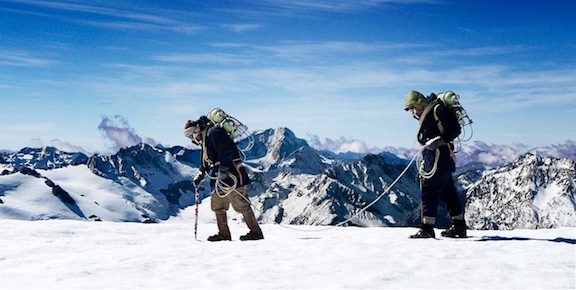
Leanne Pooley was born and raised in Canada, and now lives in New Zealand. She has directed over twenty features, including the documentaries Haunting Douglas (03), The Promise (05), Try Revolution (06), and Shackleton’s Captain (12). Her documentary The Topp Twins – Untouchable Girls (09) won the People’s Choice Documentary Award at the Festival.
Beyond the Edge
will be playing as a part of the TIFF Docs program.
Women and Hollywood: Please give us your description of your film playing at TIFF.
Leanne Pooley: Beyond the Edge tells the story of the 1953 Conquest of Everest. Combining archive footage with dramatic reconstructions the film
is a 3D adventure movie which takes the audience on a journey alongside Edmund Hillary and Tenzing Norgay to the top of the world. The film is about
overcoming obstacles, not just those presented by Mount Everest itself (which in 1953 many thought to be insurmountable) but also the obstacles within. As
Sir Edmund Hillary once said, it’s not the mountain you conquer but yourself.
WaH: What drew you to this script? If you are the writer too, why did you write this script?
LP: I was approached to write and direct this film by producer Matthew Metcalfe. It is the 60th Anniversary of the first summit of Everest so it seemed the
perfect time to tell this story. Like many people I knew New Zealander Sir Edmund Hillary and Sherpa Tenzing Norgay were the first to get to the top of
Everest, but I didn’t have any idea how they did it. The more I read the more excited I became about the project and it took very little to persuade me to
come onboard. This is a great story, in New Zealand it is “the” story, I feel incredibly honored to have been given the opportunity to tell it.
WaH: What was the biggest challenge?
LP: There were really two key challenges.
The first was the environment itself. Shooting a 3D movie on top of a mountain isn’t straight forward. Altitude, weather, safety; there were a number of
significant issues to deal with. Simply getting the crew to location everyday (New Zealand’s Southern Alps) took hours and many chopper runs. We couldn’t
leave any gear on the mountain as we never knew what the weather would do and whether or not we’d be able to get back the following day. This meant the
shoot days were unpredictable and condensed. We also shot on Mount Everest itself, possibly the most extreme location on earth! No shortage of challenges
on either shoot.
The second significant challenge is in ensuring the audience experiences the tension, the drama and the excitement of the journey; despite knowing how it
ends! I really want the audience to be on the edge of their seats, for them to feel the anxiety, the trepidation and the exhilaration that the climbers
experienced in 1953. One of the reasons we chose to shoot in 3D was to make the film as experiential as possible, the challenge is to ensure everyone in
the theater feels they’ve climbed their own mountain.
WaH: What advice do you have for other female directors?
LP: I would give female filmmakers the same advice I’d give any filmmaker; believe in your vision, believe in your team, believe in yourself. Less
philosophically I’d say, you can never be too prepared. I don’t believe creativity needs to come from chaos, I find it’s easier to be creative when I’m
really “ready”.
WaH: What’s the biggest misconception about you and your work?
LP: That I only direct documentaries. I see myself as a storyteller, I don’t mind if the story is fact or fiction, if it’s a good story I’d like to tell
it.
WaH: What are the biggest challenges and or opportunities for the future with the changing distribution mechanisms for films?
LP: I don’t really feel qualified to speak to this. I am desperately trying to keep up with the changes and at this stage I’m not sure what the future
holds. While it is increasingly possible for filmmakers to find an audience on their own (something that is particularly popular amongst documentary
filmmakers) I’m still a believer in the “specialist”. By this I mean, I back myself as a filmmaker, but I leave the marketing and distribution of my films
to the experts.
WaH: Name your favorite women directed film and why.
LP: Whale Rider directed by Niki Caro. From New Zealand, Whale Rider showed that a small film with a very specific cultural identity
could reach beyond the boundaries of its homeland to find an audience worldwide. Whale Rider proved that a good story, beautifully told, with
wonderful performances can be universally appreciated.






